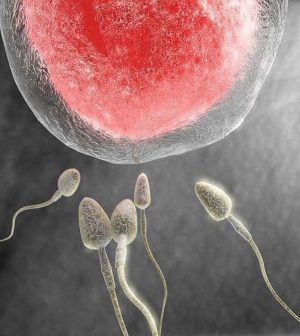- Recognizing the Signs of Hypothyroidism
- 10 Strategies to Overcome Insomnia
- Could Artificial Sweeteners Be Aging the Brain Faster?
- Techniques for Soothing Your Nervous System
- Does the Water in Your House Smell Funny? Here’s Why
- Can a Daily Dose of Apple Cider Vinegar Actually Aid Weight Loss?
- 6 Health Beverages That Can Actually Spike Your Blood Sugar
- Treatment Options for Social Anxiety Disorder
- Understanding the Connection Between Anxiety and Depression
- How Daily Prunes Can Influence Cholesterol and Inflammation
No Sign Prior COVID Infection Affects a Woman’s Fertility: Study

COVID-19 infection doesn’t reduce the chances of successful fertility treatment in women, a small new study suggests.
Concerns have been raised about how the virus affects women’s fertility because it invades its target cells by binding to the ACE2 receptor, which is widely expressed in the ovaries, uterus, vagina and placenta, the Spanish researchers explained.
Their study followed 46 women who underwent in vitro fertilization (IVF) at 11 clinics in Spain between May and June 2020.
The researchers measured the women’s hormone levels before they started treatment. That included levels of anti-Mullerian hormone (AMH), a marker of ovarian reserve. Based on their AMH levels, they were classified as normal or low responders to ovarian stimulation when treatment began.
Although AMH levels can predict how women might respond to ovarian stimulation in IVF, there are doubts about its reliability as a marker of overall female fertility, according to the researchers.
Still, the study found “no variation in AMH levels before and after SARS-CoV-2 infection, and we could assume that the chances of success in their fertility treatment remained intact,” said study author Maria Cruz Palomino, from IVI Madrid, in Spain.
The study will be presented online June 28 at the annual meeting of the European Society of Human Reproduction and Embryology (ESHRE). Research from meetings is considered preliminary until published in a peer-reviewed journal.
And while the researchers did find a slight decrease in AMH levels in women predicted to be normal responders to ovarian stimulation, it was not a “radical decrease” and would be unlikely to compromise ovarian reserve.
Nor “can we attribute this variation to SARS-CoV-2 infection,” Palomino said in a society news release.
This was a small study that doesn’t provide strong enough findings for definitive public health recommendations, but it does add to other research suggesting that ovarian function, as reflected in AMH levels, is not affected by SARS-CoV-2 infection, Palomino said.
The results indicate that “we could assume that the chances of success of fertility treatment remain intact,” she said.
A recent study from Wuhan, China, found that average sex hormone and AMH levels in women of childbearing age with COVID-19 were not different from those of non-infected women of similar ages.
More information
The American Society for Reproductive Medicine offers COVID-19 resources for patients.
SOURCE: European Society of Human Reproduction and Embryology, news release, June 28, 2021
Source: HealthDay
Copyright © 2026 HealthDay. All rights reserved.










